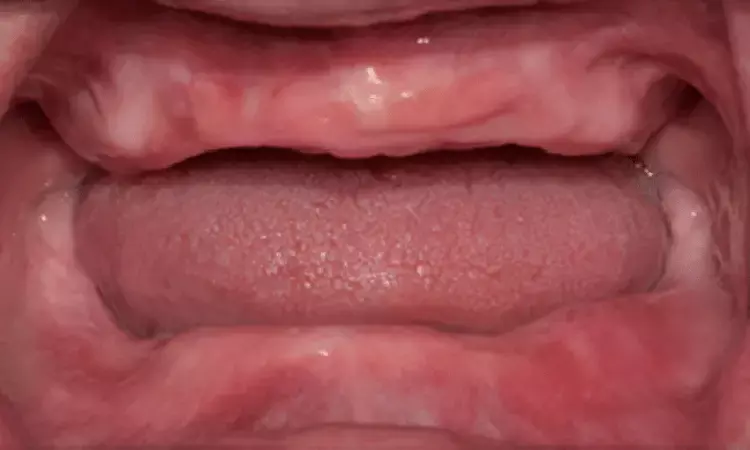- Home
- Medical news & Guidelines
- Anesthesiology
- Cardiology and CTVS
- Critical Care
- Dentistry
- Dermatology
- Diabetes and Endocrinology
- ENT
- Gastroenterology
- Medicine
- Nephrology
- Neurology
- Obstretics-Gynaecology
- Oncology
- Ophthalmology
- Orthopaedics
- Pediatrics-Neonatology
- Psychiatry
- Pulmonology
- Radiology
- Surgery
- Urology
- Laboratory Medicine
- Diet
- Nursing
- Paramedical
- Physiotherapy
- Health news
- Fact Check
- Bone Health Fact Check
- Brain Health Fact Check
- Cancer Related Fact Check
- Child Care Fact Check
- Dental and oral health fact check
- Diabetes and metabolic health fact check
- Diet and Nutrition Fact Check
- Eye and ENT Care Fact Check
- Fitness fact check
- Gut health fact check
- Heart health fact check
- Kidney health fact check
- Medical education fact check
- Men's health fact check
- Respiratory fact check
- Skin and hair care fact check
- Vaccine and Immunization fact check
- Women's health fact check
- AYUSH
- State News
- Andaman and Nicobar Islands
- Andhra Pradesh
- Arunachal Pradesh
- Assam
- Bihar
- Chandigarh
- Chattisgarh
- Dadra and Nagar Haveli
- Daman and Diu
- Delhi
- Goa
- Gujarat
- Haryana
- Himachal Pradesh
- Jammu & Kashmir
- Jharkhand
- Karnataka
- Kerala
- Ladakh
- Lakshadweep
- Madhya Pradesh
- Maharashtra
- Manipur
- Meghalaya
- Mizoram
- Nagaland
- Odisha
- Puducherry
- Punjab
- Rajasthan
- Sikkim
- Tamil Nadu
- Telangana
- Tripura
- Uttar Pradesh
- Uttrakhand
- West Bengal
- Medical Education
- Industry
Early-life adversity marked by threat linked to increased risk of edentulism

Chronic psychosocial stress experienced in childhood is thought to be associated with long-term health and disease risk. In particular, early life adversity (ELA)—experiences that represent a deviation from the expected environment and require adaptation, including childhood abuse, sexual assault, neglect, and chronic poverty—create risks for lifelong chronic diseases.
Early-life adversity marked by threat is linked to an increased risk of edentulism suggests a recent study published in the BMC Oral Health
Emerging evidence indicate the relationship between Early-life adversity with oral health problems. However, most focus on single types of adversity. The association of cumulative ELA with edentulism, the final marker of disease burden for oral health, remains unclear.
Data came from 17,610 elderly participants in the China Health and Retirement Longitudinal Study (CHARLS). In 2014, the Life History Survey Questionnaire was utilized to evaluate the experience of threat and deprivation. Information on edentulism was evaluated through self-report from the follow-up in 2013, 2015, and 2018. By controlling for age, education, hukou residence, marital status, and disease history, logistic regression analyses were used to evaluate the relationships between distinct dimensions of ELA and risk of edentulism.
Results:
Nearly half (49.8%) of the 17,610 older persons reported experiencing early adversity due to threat-related ELA, and 77.9% reported having deprivation-related ELA.
ELA characterised by threat was associated with edentulism in both male and female participants.
Two forms of threat-related ELA exposure were linked to a 1.65-fold and 1.73-fold higher risk for edentulism in both male (95% CI 1.23, 2.21) and female participants (95% CI 1.31, 2.29), compared to no threat-related ELA exposure.
Both male (95% CI 2.34, 4.24) and female participants (95% CI 2.49, 4.56) had a 3.15-fold and 3.37-fold higher risk for edentulism when exposed to three or more threat-related ELAs.
The findings suggest that Early-life adversity marked by threat is linked to an increased risk of edentulism. The biological pathways between different dimensions of Early-life adversity and teeth loss should be clarified by future research.
Reference:
Tang, Z., Huang, C., Li, Y. et al. Early-life adversity and edentulism among Chinese older adults. BMC Oral Health 22, 542 (2022). https://doi.org/10.1186/s12903-022-02595-3
Dr. Shravani Dali has completed her BDS from Pravara institute of medical sciences, loni. Following which she extensively worked in the healthcare sector for 2+ years. She has been actively involved in writing blogs in field of health and wellness. Currently she is pursuing her Masters of public health-health administration from Tata institute of social sciences. She can be contacted at editorial@medicaldialogues.in.
Dr Kamal Kant Kohli-MBBS, DTCD- a chest specialist with more than 30 years of practice and a flair for writing clinical articles, Dr Kamal Kant Kohli joined Medical Dialogues as a Chief Editor of Medical News. Besides writing articles, as an editor, he proofreads and verifies all the medical content published on Medical Dialogues including those coming from journals, studies,medical conferences,guidelines etc. Email: drkohli@medicaldialogues.in. Contact no. 011-43720751


